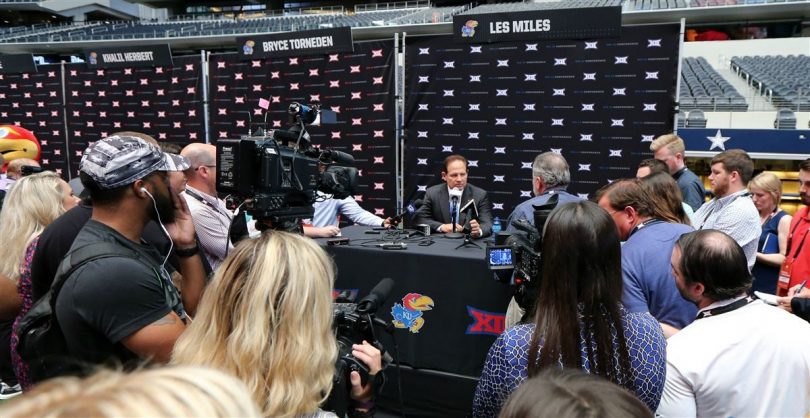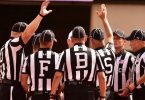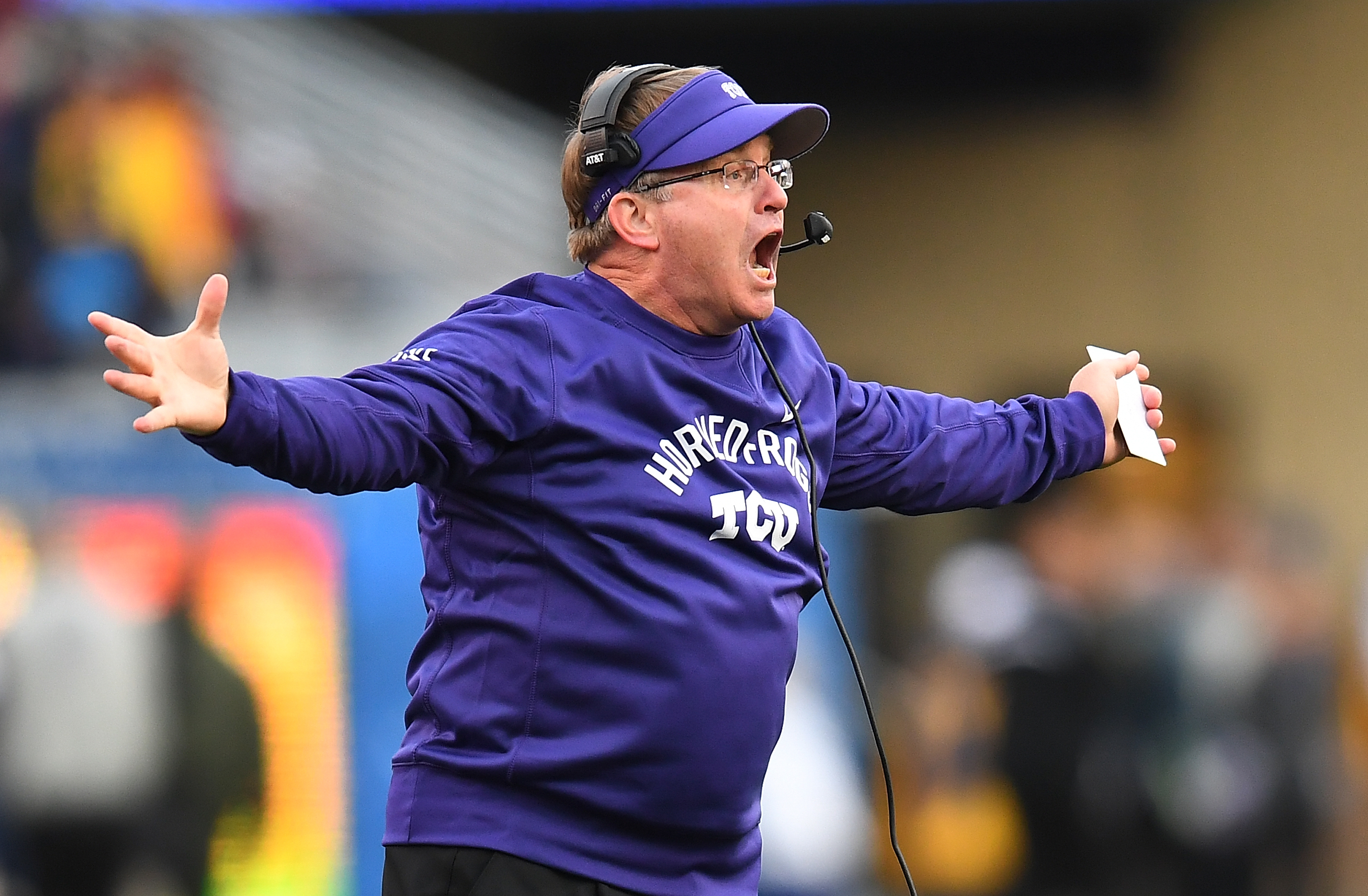ARLINGTON – Forecasts at media days are always clear skies and perfect temperatures. Coaches are loath to speak about cloudy conditions, much less storm fronts.
It was happenstance that Les Miles was batting leadoff for Big 12 Media Days. The new Kansas coach was the first of five coaches to stand at the podium and take questions. For a program that has become a perennial football flop, it was a great opportunity for the personable Miles to pump sunshine.
Miles, though, opened his remarks by discussing something other than football, a tempest not entirely of his creation but he nonetheless had to deal with.
Last week, Kansas announced that sophomore running back Pooka Williams had been reinstated following a seven-month suspension. His penance would be sitting out the Jayhawks’ season opener against FCS Indiana State.
Williams, a speedy running back who was one of the bright spots for KU last season, was arrested and charged with domestic battery. That led to his suspension from team activities and the legal system allowed him to avoid jail time via a diversion agreement.
“I did not make this decision, but I stand by the decision and it’s the right one,” Miles said Monday. “Violence against women will not be tolerated. Action was taken immediately and Pooka wasn’t involved in team activities in seven and a half months.”
Miles said that Williams crossed his t’s and dotted his i’s in terms of his conduct since the incident. If that’s the case, it seems strange to suspend him even for one game. And even if the decision wasn’t totally up to Miles, the KU administration’s judgment is worth questioning.
Two decades ago, Brenda Tracy was raped by several Oregon State players. She has become a vocal advocate educating college players about respecting women and avoiding domestic violence/sexual assault. She preaches “set the expectation” and she believes Miles fell short.
Tracy tweeted: “No suspension says: ‘If the law says he can play, we’re playing him.’ A 1-game suspension says: ‘We believe you (the victim), we just don’t think you matter.’ ”
Miles was adamant that he had no say in the Williams decision. Make your own judgment of that statement.
“Personally, I’m not going to comment on that, that’s her personal view on this situation,” Miles said during a break-out interview session. “I don’t think a coach should get involved in these type of discipline issues because he has a personal interest, it’s hard to not get involved emotionally. I’m for the process.”
Athletic director Jeff Long had the final say on Williams’ suspension. He fired David Beaty (who is still owed $3 million) and hired Miles ($5 million per year). Long is on a five-year contract that pays him $3 million a year. His main mission: fix football.
Assuming the Jayhawks can win their opener, Game Two is against Coastal Carolina of the Sun Belt Conference with the final nonconference game against Boston College. Getting Williams back after Week One is crucial for a winnable but still challenging game is important. A 2-1 start at least brings hope of matching last season’s three victories. A 1-2 start and the funeral march to another 1-11 season begins.
There’s no argument that Miles and the Kansas administration are privy to facts and details not available to the general public. The judicial system does not render one-size-fits-all verdicts. Crimes and punishment often don’t match. For two examples, Google O.J. Simpson and Jeffery Epstein.
But allowing coaches – even with the guidance of their bosses — to decide on punishments via game suspensions is folly. It’s like a circuit court judge in a one-stoplight town ruling on a double homicide. Coaches are far closer to Judge Judy than Oliver Wendell Holmes.
If you’re naïve and don’t believe coaches make decisions to help win games, consider this. A survey conducted by the National Athletic Trainers Association produced two concerning opinions. Trainers answered that 36% of coaches influence the employment of the team’s medical staff and 19% say a coach has played a student-athlete who wasn’t medically cleared to play.
A coach who will play an injured athlete is just as likely to be lenient with a healthy athlete who just had a “misunderstanding” with a female friend.
A year ago, the Big Sky Conference adopted a Serious Misconduct Rule. It prevents individuals with a history of convicted violence to receive athletic-related financial aid or participate in practice or competition.
“This rule sets the tone and expectations the Conference has for its institutions,” Big Sky commissioner Andrea Williams said in a news release announcing the policy. “The Big Sky is taking ownership and accountability for the culture we create and reputation we project on campus, within our community and in our conference.”
Two years ago, the Big 12 adopted a similar policy.
“It calls upon institutions to make sure that decisions on who plays and who evaluates those situations that they’re made outside the head coach (office),” commissioner Bob Bowlsby said Monday. “Institutions are left to do what they think is right, but it’s going to be made at the highest levels with the university. We feel like if that’s the standard, that universities can be counted upon to go through the right processes and come to the right conclusions.”
All well and good. But it’s a policy that appears to have baby teeth and no bite.
During his time at LSU, Miles was inconsistent in terms of player discipline. There were three that were most notable. In 2011, the Tigers were undefeated and before a game with Auburn, he suspended two of his best players (Tyrann Mathieu and Spencer Ware). In 2008, quarterback Ryan Perrilloux was kicked off the team. In 2013, he allowed the team to vote on the reinstatement of running back Jeremy Hill.
The cynical argument could be made that the KU administration administered a one-game suspension for Williams – who rushed for 1,125 yards and seven touchdowns as a freshman – because hiring Miles is the school’s bid for football respectability, and he needs all the help he can get.







